The Women's March, held in a number of cities around the U.S. in January 2017, kicked off a new wave of protests that have spanned President Donald Trump's first term. Katie Killpack, is pictured third from right, standing at the march in Washington, D.C., with friends. (Provided photo)
Think about who has inspired and motivated you to be concerned about helping others have a better life. Consider why it is important to have role models who show us what is possible in living a life of faith in action.
Catholic sisters have long been willing to speak out about just treatment of the poor, those at the margins of society, and the oppressed. Sisters in traditional habits were part of the marches for civil rights in the 1950s and '60s, motivated by their religious belief that all humans have dignity as children of God. Over the last seven decades, our Catholic sisters have continued to stand in solidarity with many groups working for social justice. These sisters have much to teach us about what solidarity looks like, and how it needs to be grounded in an inner spirituality that sustains the outer work of justice. They are inspiring a new generation of "nones," young adults who do not identify with a specific religion.
Sisters share spiritual foundation of activism with younger 'nones'
By Soli Salgado
Though she didn't know then that her activism would eventually span 50 years, Sr. Gwen Farry's efforts in advocacy began with the grape boycott in the 1960s, handing out fliers outside grocery stores regarding the working conditions of the California farmhands, and later visiting the farms with other sisters and an interfaith group and meeting labor rights activist César Chavez.
Since then, Farry, a Sister of Charity of the Blessed Virgin Mary, would protest, get arrested, block traffic, stage sit-ins, accept fines. She'd demonstrate against nuclear weapons, the clandestine military training at School of the Americas, immigration laws, cuts to social services.
For the many sisters who, like Farry, have dedicated their lives to fighting injustice, engaging in protests and activism is an expression of faith, a form of prayer in action that helps maintain a sense of hope amidst the often-slow pace of change. Some young activists are adopting those concepts, learning from the vast experiences of sisters regarding effective advocacy and the spiritual dimension of activism — carrying on that spirit in the absence of sisters among today's protesting crowds.
It's been a frustrating time for lifelong activists who are also elderly, as the spring and summer of 2020 in the United States have been characterized by both mass protests against racial injustices as well as the coronavirus pandemic that has claimed more than 210,000 lives in the U.S. (More than 90% of sisters are older than 60, a demographic particularly vulnerable to the virus.) While the restrictions required by the pandemic have stopped Farry and many other sisters from joining protests — spurring them to effect change through petitions and calling politicians instead — some of today's young activists are drawing on the inspiration of women religious as they take to the streets.

Left: Sr. Gwen Farry, a Sister of Charity of the Blessed Virgin Mary, center, holding a "Stop Deportations" sign, participates in a demonstration outside the Immigration and Customs Enforcement office in Chicago in 2015; Right: Farry, center, protests social service cuts that former Illinois Governor Bruce Rauner proposed in 2016. (Provided photos)
Through contact with sisters, including via Nuns and Nones (also called Sisters and Seekers), like-minded young adults have fostered meaningful dialogues and relationships with sisters eager to connect with younger generations. And while the non-sisters may range from atheist to spiritual to Catholic, they're united with sisters in their passion for social justice — or Gospel values, depending who you ask.
"Nuns and Nones is helping me shape my identity as an activist," said 31-year-old Brittany Koteles, the co-director of Nuns and Nones. Though she grew up Catholic, she describes her spiritual inclinations now as "all of the above" rather than "none of the above."
"Sisters have crafted their lives to be of service in the world," she said. As she reflects on her own commitments and the larger purpose, she says, "Nuns and Nones has supported me in continuing to commit on a deeper level."
Her first arrest was with sisters in 2019, when hundreds of Catholics gathered on Capitol Hill for what organizers called a "Catholic Day of Action for Immigrant Children," and 70 Catholic leaders (plus Koteles) were arrested for their civil disobedience while protesting the treatment of immigrants at the border. Though she had for years considered herself an activist, she sensed a different approach to this gathering because of how sisters had orchestrated it.
The language in the correspondence, for example, caught her attention: "It was like, 'an invitation to discern risking arrest' — there is a level of care and spiritual practice that is woven into the action itself," said Koteles, who learned of the event through her local Nuns and Nones group.
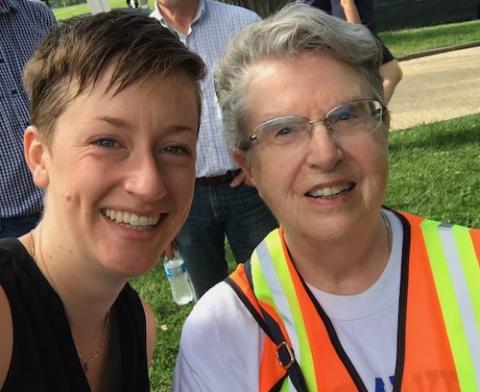
Brittany Koteles, left, co-director of Nuns and Nones, takes a selfie with Immaculate Heart of Mary Sr. Joan Mumaw at a 2019 demonstration against the treatment of immigrants at the border. "The whole thing was a literal embodiment of sisters helping us find our way in this fight," Koteles said. "There Joan was, literally showing me the way with her marshal flag, but also, supporting me to show up in the generations-long fight for justice from a place of spiritual groundedness and love for the world." (Provided photo)
"When that happens, the participants are able to more deeply understand their action as an expression of love, and that changes everything."
She recalls feeling a sense of safety and relief that her arrest was alongside dozens of experienced sisters whose "spiritual maturity" changed her experience of the event.
"Oftentimes it's not guaranteed that direct action comes with that source of groundedness, and frankly, I think it's something that movements can sometimes struggle with."
Sr. Susan Wilcox said she found "the Gospel really starts being more alive," once she experienced civil disobedience and being arrested as a sister, much of which was with Occupy Wall Street starting in 2011.
The Sister of St. Joseph of Brentwood, New York, pointed to a common phrase among activists, of "putting your body on the line"— strikingly Christian imagery from her perspective, she said, "because who put their body on the line more than Jesus did?"
Only then did it occur to her that "wouldn't this be what everybody who was a follower of Jesus would do, put their body on the line for the poor and oppressed and for injustice or for speaking truth?" said Wilcox, the coordinator of her congregation's Justice, Peace, Integrity of Creation office.
"I had never really been taught that way, so I didn't think that way until I was in it. And then I'm like, oh, wow, this is so Christian."
In a call to transform the world, steadily
Perhaps an explanation for the poetic language of sisters that Koteles noticed around demonstrations, is that the words "protest" or "activist" don't sound right to some sisters.
Wilcox prefers "action, march, demonstration, nonviolent civil disobedience or nonviolent direct action" to the word "protest," which she finds limiting and a bit of a media darling.
And though St. Joseph of Brentwood Sr. Maryellen Kane has protested nuclear armaments, marched for the environment and immigration, and is active in community organizing, she still doesn't consider herself an activist.
"I don't like that word. I think of myself more as a participant in the transformation of the world," she said, or "living out the Gospel." To her, baptism is ultimately a call "to transform the world."
Working closely with sisters through both her job and Nuns and Nones, 29-year-old Rachel Drotar said sisters have taught her that activism is not something you participate in, but rather, integrate into your life.
Drotar is the Generative Spirit program coordinator at the Sisters of Charity Foundation of Cleveland, an initiative intended to cultivate collaborative relationships between sisters and young adults, "looking at a changing church and how justice can be part of that change." Through her work, she discovered Nuns and Nones to be a natural fit for her.
She recalled a recent Nuns and Nones group call in which sisters shared the difficulty of isolation during the pandemic but emphasized how painful it is to not be with those they serve in ministry. Seeing how justice is the center of their lives was, for Drotar, a "wake up call."
"This is the long game, and activism is not really event-based, but more rooted in ongoing work and ministry, guided throughout with spirituality and Catholic social teaching," she said.
Sisters advise that committing to the long haul requires patience, supportive relationships and focus, lest burnout or disillusionment eclipse the mission.
A 34-year-old Nuns and Nones member in New York, Katie Killpack said she used to think yelling was necessary at demonstrations, and that unless you were flirting with burnout, you weren't trying hard enough.
After returning from a Black Lives Matter march this summer and talking to the sisters all revved-up, Killpack remembers the calm demeanor of a sister who reminded her that this work "isn't a flash in the pan" but an everyday obligation, and that she personally found sustenance in contemplative prayer. Since then, Killpack does, too.
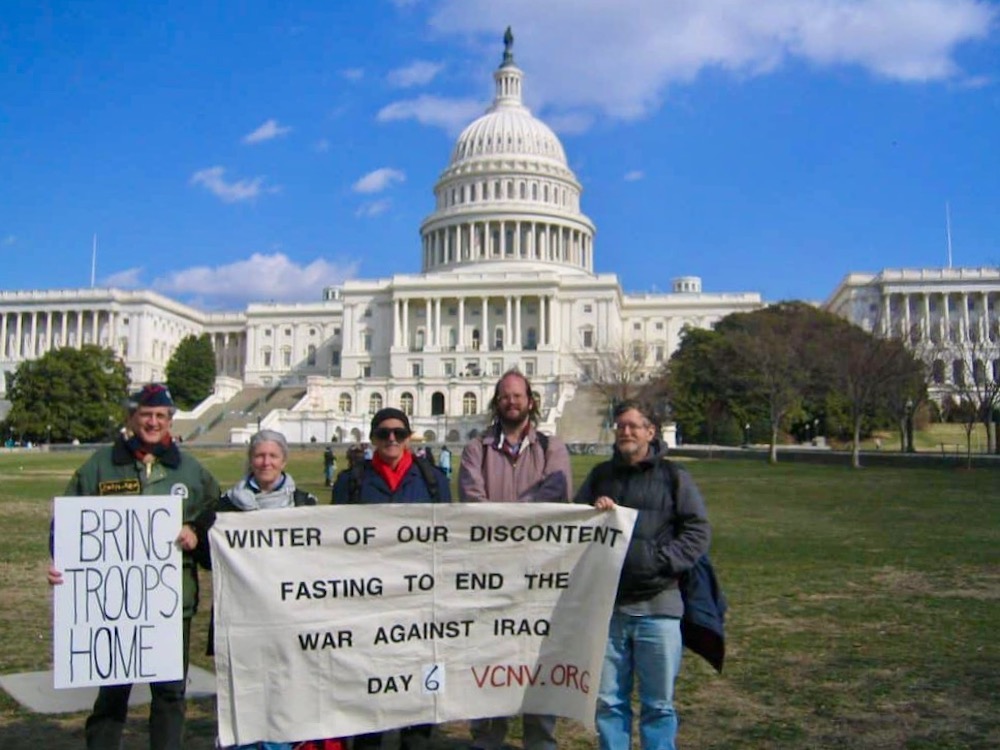
On the eighth of what was a 34-day fast, Carmelite Sr. Maureen Foltz, second from left, stands at the U.S. Capitol in February 2006 for the "Winter of Our Discontent" protest, a liquid-only diet call for U.S. peace. She is pictured with veterans Mike Ferner, Bernie Meyer, Jeff Leys and Ed Kinane, who also fasted. (Provided photo)
Sr. Maureen Foltz, a Carmelite Sister of Charity, Vedruna who currently lives in Riverdale, Maryland, said that the ability to persevere is tied to someone's initial motivation.
At any action or civil disobedience, she said, people may gather for different reasons, but "there's a certain essential piece to it for people that connects at the deepest level. And the only word of wisdom that I would give is that the essence of this gift that you carry within you, don't allow it to get cheapened or dissipate with time.
"There's an essential truth to a lot of what we're living when we're living these experiences of God in the world, and if you have that gift, there's a certain responsibility to care for it in a healthy way."
Foltz's "spirituality of resistance movement," as she said they once called it, began with the U.S. involvement in Central America in the 1980s, which prompted an influx of refugees whom Foltz and her bilingual community tended to with their homeless shelters.
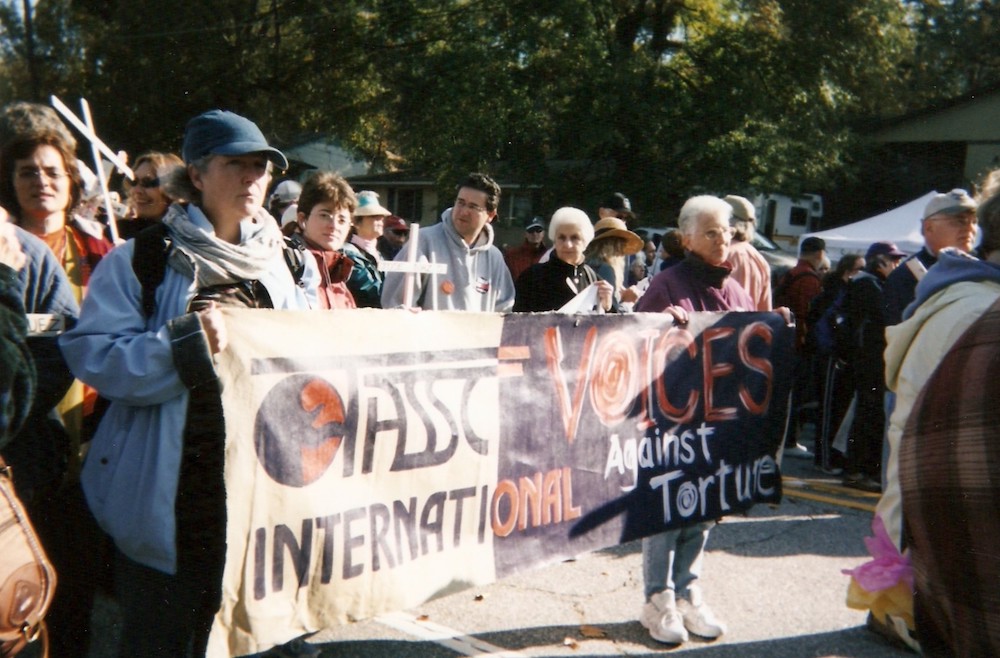
Carrying a banner for the Torture Abolition Survivors Support Coalition, Carmelite Sr. Maureen Foltz, left, in the blue baseball cap, protested the School of Americas in Fort Benning, Georgia, for several years. (Provided photo)
Fear may have been the "outstanding emotion" she felt as a novice in the early days of activism, but eventually, Foltz said she "grew in my sense of indignation. It was a real motivator for me."
And to young activists, she says "make sure your view of the other — be it the policeman in front of you or the president of the United States — doesn't lose their humanity." Without that perspective, Foltz said, it's easy to fall into cynicism, hatred, anger and possibly violence.
"If your premise is that the indwelling of the Divine or the sacred or God or whatever you want to call it, is in the human experience and in the human person, then you cannot say that it's only in some. If it's a premise that you live for, then that's the truth of it."
It's about relationships — and patience
Some sister activists say choosing a particular cause to devote energy to is key to sustaining momentum.
In her 36 years advocating for justice issues, Sr. Helen Gourlay (now 84) said she's learned that focus provides mileage: "I decided that I would focus on one issue and be supportive of others," advice that she extends to young activists who feel tempted to stretch in multiple directions.
Nuclear disarmament was the primary focus for her, a Sister of Charity of the Blessed Virgin Mary like Farry. But that didn't keep Gourlay from an array of issues. Though not her focus, she still showed support for other causes by marching and protesting the Gulf War, immigration issues and gun violence, and even going on a peace mission to the Soviet Union. She also participated in demonstrations regarding U.S. policies in Latin America that sometimes led to detainment — the first time she "crossed the line," she said, referring to her arrests. These days, she's writing elected officials, signing petitions, praying and keeping tabs on several issues of interest.
Picking an issue to focus on, said Sr. Maryellen Kane, executive director the U.S. Federation of the Sisters of St. Joseph, isn't a decision so much as a response to the obvious. "They look for you; you don't look for them. … The circumstance of your life determines how and when you respond."
Previously a labor organizer and now a community organizer, Kane said that effecting change boils down to building relationships, as activism is "more about relationships than a particular issue." Once relationships and the organization are in place, "you can go from issue to issue to issue," responding to whatever is immediately affecting the community, she said.
Gourlay noted that, because different roles contribute to the "overall picture," changing roles within a movement is also one way to back off before feeling spent.
Some may be more drawn to public demonstrations that shift public awareness and display solidarity, while others, like Kane, are more compelled to the behind-the-scenes work that works to change systems. In Brooklyn, New York, she was engaged in issues around sanitation, traffic lights, schools and the Nehemiah Housing project, which built 5,000 units of affordable housing in New York City.
"Real change comes through organizing, through the community coming together, dialoging," she said. "It doesn't come about by the big march. That brings attention to it and raises your spirit to know you're not alone, but the actual work is time-consuming and takes a lot more patience."
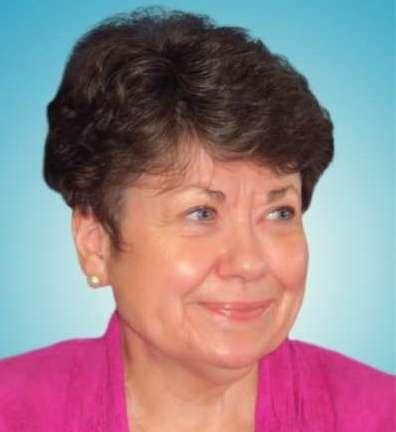
Sr. Maryellen Kane, executive director of the U.S. Federation of the Sisters of St. Joseph (Provided photo)
It is about being human, and it is enough
Foltz considers engaging in justice issues to be a need for her, a source of "spiritual nutrients" that for other sisters may be found in the Eucharist or quiet prayer. The kind of spirituality that compels sisters to have a framed picture of Jesus, she said, was never one she could relate to; encountering the homeless, however, was "a very deep spiritual experience for me."
"For someone like myself, living in these impoverished neighborhoods among the marginalized of the world, and joining them to speak for their rights and being in the streets, that's what nourishes my relationship with God."
Despite no longer considering herself Catholic, Koteles said that the social, spiritual and theological framework that sisters place around this moment and "their duty in this moment" has been orienting for her.
Whether it's from their formation or daily practices, she believes there's "something about sisters" that allows them to "situate this moment in a much longer arc and in the question of what it means to be human."
Drotar sees a lesson in how sisters whose communities are coming to completion look to an uncertain future with more hope than anxiety. The history of sisters — one that responds to the needs and signs of the times — inspires her to think about how she can best apply herself to today's issues, and how "hope can come from evolution."
Sisters have taught Koteles that "hope isn't knowing it's all going to turn out okay. Hope is showing up anyway," following through with your life commitments and "trusting that that's enough."
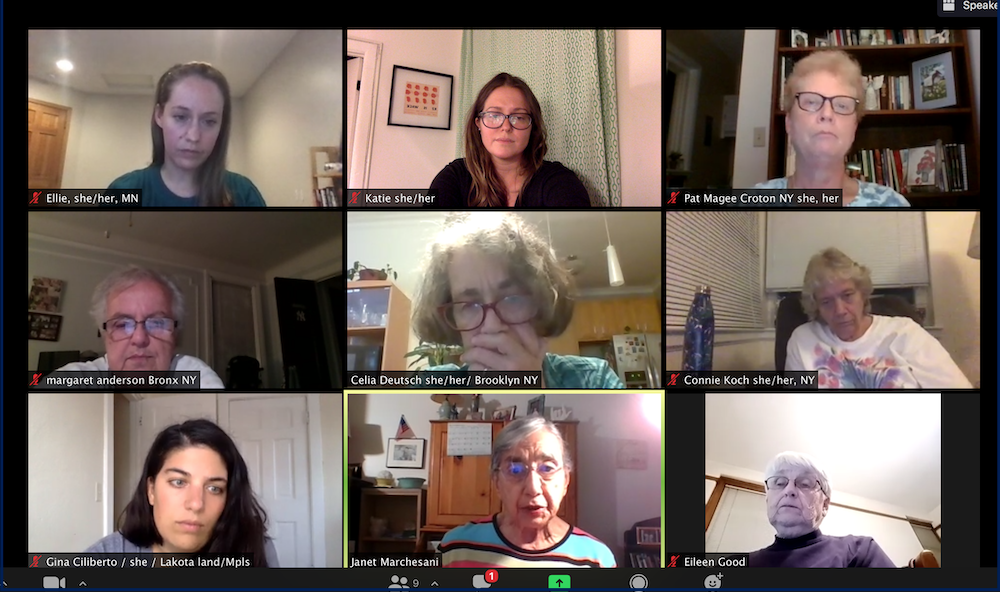
Screenshot of a Zoom-based Nuns and Nones New York group meeting, showing Katie Killpack at top, center on Sept. 28. The theme was "Seeking Justice: How are people taking action? How can others join them?" (Provided screenshot)
What are some of the lessons that young activists for social justice are learning from sisters who have demonstrated solidarity with those denied their rights and their dignity?
How have the sisters' religious beliefs and spiritual lives shaped their work for social justice?
How has their spiritual grounding kept the sisters from despair and burnout?
What does "living out the Gospel" mean for these sisters, and how does it differ from acting out of anger and other emotions rather than acting out of a deep faith?
Why are role models important for young people as they develop as people of faith and are challenged to be the change they wish to see in the world?
How can you follow the sisters' model and develop a spirituality of solidarity with the oppressed, the poor, those at the margin, responding to the call to transform the world?
"The righteous will answer him and say, 'Lord, when did we see you hungry and feed you, or thirsty and give you drink? When did we see you a stranger and welcome you, or naked and clothe you? When did we see you ill or in prison, and visit you?' And the king will say to them in reply, 'Amen, I say to you, whatever you did for one of these least of these, you did for me' " (Matthew 25:37-40).
"If someone sees a sister or brother in need and refuses them compassion, how can the love of God remain in this person? Let us love not in word or speech but in deed and truth" (1 John 3:17-18).
An essential part of solidarity is the willingness to be present to the "least of these" so we can witness and understand their need for justice and support them "in deed," in our actions. Jesus and his disciples are very clear on this, so why is it often a challenge to be present to the suffering of others? Why is it often a challenge to support others "in deed," in actions? How can we develop our faith so we can stand with "the least of these" in loving solidarity?
Solidarity "is not a feeling of vague compassion or shallow distress at the misfortunes of so many people. ... On the contrary, it is a firm and persevering determination to commit oneself [through action] to the common good ... because we are all really responsible for all" (Pope St. John Paul II, "On Social Concerns," 1987).
"Solidarity means much more than engaging in sporadic acts of generosity. It means thinking and acting in terms of community. It means that the lives of all are prior to the appropriation of goods by a few. It also means combatting the structural causes of poverty, inequality, the lack of work, land and housing, the denial of social and labor rights. It means confronting the destructive effects of the empire of money" (Pope Francis, "On Fraternity and Social Friendship," 2020).
"We have to move from our devotion to independence, through an understanding of interdependence, to a commitment to human solidarity. ... Love implies concern for all — especially the poor — and a continued search for those social and economic structures permit everyone to share in a community that is part of a redeemed creation" (U.S. Conference of Catholic Bishops, "Economic Justice for All," 1988).
"The Spirit also opens borders between peoples. At Pentecost, the Apostles spoke the languages of those they met, and the confusion of Babel was finally resolved by the harmony brought about by the Spirit. Whenever God's 'breath' unites our hearts and makes us view others as our brothers and sisters, differences no longer become an occasion for division and conflict but rather a shared patrimony from which we can all draw, and which sets us all on journey together, in solidarity" (Pope Leo XIV, Pentecost homily, June 8, 2025).
Why are so many "devoted to independence" in our world rather than to solidarity with others?
How do our popes define solidarity and call us to connection?
How can our faith, through prayer, study, community, the Eucharist and our openness to the Spirit move us to develop a spirituality that supports solidarity?
How do the sisters in the article live out the church's calls to solidarity?
What order of sisters do you know through your school, parish, archdiocese or through other means. (You can do an online search for "Catholic sisters" in your area, or check with your archdiocese.)
Research their website, identify their justice and peace concerns, and email the sisters to thank them for their actions of solidarity with those who are suffering, who face injustice, who are at the margins. Pray for their efforts as you join with the sisters in spiritual solidarity.
How can you follow the sisters' model and develop a spirituality of solidarity with the oppressed, the poor, those at the margin, responding to the call to transform the world?
Think about what kind of a regular prayer life can help you develop to "be the change you wish to see in the world." Commit to seeking out social justice prayers that will help you pray in solidarity and challenge you to put your faith into action for others.
Jesus, you taught us that all we do for others, we do for you. Help us recognize and be present to the suffering and injustice that so many of your children endure. Bless us with the grace to stand with the suffering in solidarity, to make a difference, to be a symbol of embodied hope. Embrace us in your love and guide us through those who model this love in compassionate courage and action for justice and peace. Amen.
Tell us what you think about this resource, or give us ideas for other resources you'd like to see, by contacting us at [email protected].
